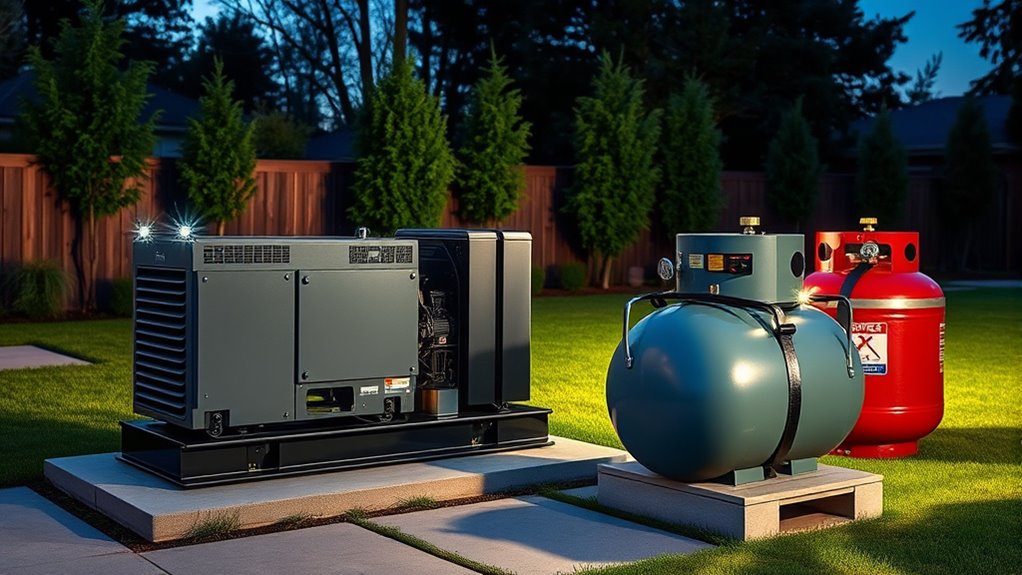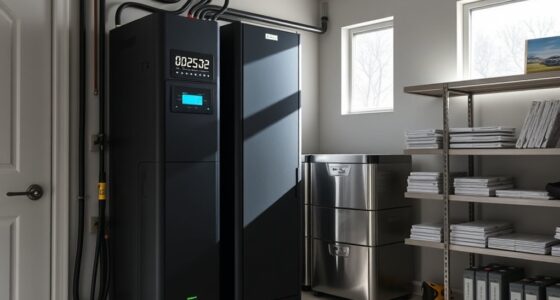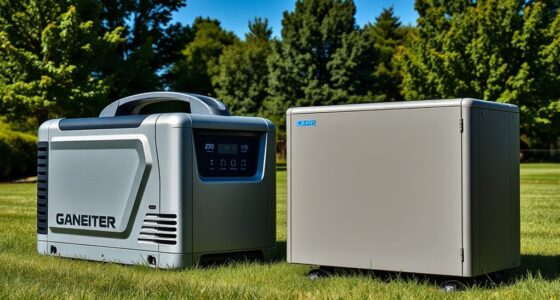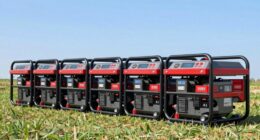When choosing between gas and propane for backup power safety, consider that propane burns cleaner, is stored pressurized, and poses less risk of spills or leaks if handled correctly. Gasoline, though easy to start quickly, requires careful storage in ventilated containers and safe handling to prevent fumes or spills. Proper placement, ventilation, and regular maintenance are essential for safety with either fuel. Keep exploring to learn detailed safety steps that protect you and your loved ones.
Key Takeaways
- Proper storage, handling, and ventilation are essential for both gas and propane to ensure safety during backup power use.
- Propane tanks are pressurized and stored in well-ventilated areas, reducing leak risks compared to gasoline’s open containers.
- Regular system inspections, leak detection, and maintenance prevent dangerous leaks and system failures.
- Place generators outdoors, away from structures, and ensure proper ventilation to prevent fumes buildup and fire hazards.
- Immediate action, including leak detection and evacuation, is critical for safety during any fuel leak or system malfunction.

Honeywell 22kW Home Standby Generator
PrecisionPower Technology delivers best-in-class power quality with less than 5 percent total harmonic distortion for clean, smooth operation...
As an affiliate, we earn on qualifying purchases.
Understanding Fuel Types and Storage Methods

Understanding the different fuel types and storage methods is essential for ensuring safe and reliable backup power. Gasoline and propane each have unique characteristics affecting fuel efficiency and environmental impact. Gasoline offers quick start-up and high energy content, but it’s less fuel-efficient over time and produces more emissions, impacting the environment negatively. Propane, on the other hand, burns cleaner, with lower emissions and a more stable storage life, making it more environmentally friendly. Storage methods also differ: gasoline needs airtight containers in well-ventilated areas to prevent fumes and spills, while propane is stored as a pressurized liquid in approved tanks, reducing the risk of leaks. Proper storage safety practices are crucial to prevent accidents and ensure the safe use of these fuels. Knowing these differences helps you make informed decisions about which fuel best suits your backup power needs, balancing safety, efficiency, and environmental considerations.

DuroStar DS13000MX 13,000-Watt 500cc Dual Fuel Portable Generator - Gas and Propane, Remote Electric Start, Whole Home Power Backup, Transfer Switch Ready, RV & Emergency Ready
13,000 Watts of Reliable Power for Home Power Backup – Keep your home, job site, or RV powered...
As an affiliate, we earn on qualifying purchases.
Safety Precautions for Handling Gasoline Generators

Handling gasoline generators safely requires careful attention to prevent accidents and health hazards. Always operate your generator outdoors in a well-ventilated area to avoid dangerous fuel odors and buildup of fumes. Before starting, check for leaks or spills, and never refuel while the engine is hot or running. Keep a fire extinguisher nearby in case of emergencies. Be mindful of generator noise, which can indicate issues or cause disturbance; if it gets unusually loud, turn off the unit and inspect it. Store gasoline in approved containers, away from heat sources and flames. Regular maintenance also helps prevent leaks and ensures safe operation. Additionally, ensuring proper airless paint sprayer maintenance can prevent malfunctions and increase safety during operation. By following these precautions, you can reduce risks and keep yourself and others safe while using your gasoline generator.

Champion Power Equipment 201222 22 kW aXis Home Standby Generator with 200A Whole House Switch
Up to 20% more fuel efficient than leading competitors, this 22-kilowatt generator provides 22,000 watts of continuous power...
As an affiliate, we earn on qualifying purchases.
Handling and Storage of Propane Tanks Safely

When working with gasoline generators, safety also extends to how you manage your fuel sources, especially propane tanks. Proper handling and storage are crucial to prevent accidents. Always label your tanks clearly with tank labeling to identify contents easily and avoid mix-ups. Store tanks in a cool, well-ventilated area away from heat sources or flames. When transporting, follow transportation safety guidelines to prevent leaks or ruptures. Secure tanks upright during movement to avoid tipping. Keep a fire extinguisher nearby and inspect tanks regularly for damage or corrosion. Use the following table as a quick reference:
| Aspect | Safety Tip |
|---|---|
| Tank Labeling | Clearly mark contents and expiry date |
| Storage Location | Cool, ventilated, away from heat sources |
| Transportation Safety | Secure upright, avoid rough handling |
| Leak Inspection | Check for corrosion or damage |
| Fire Safety | Keep extinguisher nearby, no open flames |
In addition, understanding the influence of AI on safety practices can help implement smarter monitoring and alert systems for propane storage.

Pulsar GD10KBN 10500W Dual Fuel Home Backup Portable Inverter Generator with Wheel Kit and Electric Start RV Ready
Dual Fuel: Allows your generator to run on either gasoline or propane, offering the freedom and flexibility of...
As an affiliate, we earn on qualifying purchases.
Ventilation and Placement Guidelines for Generators
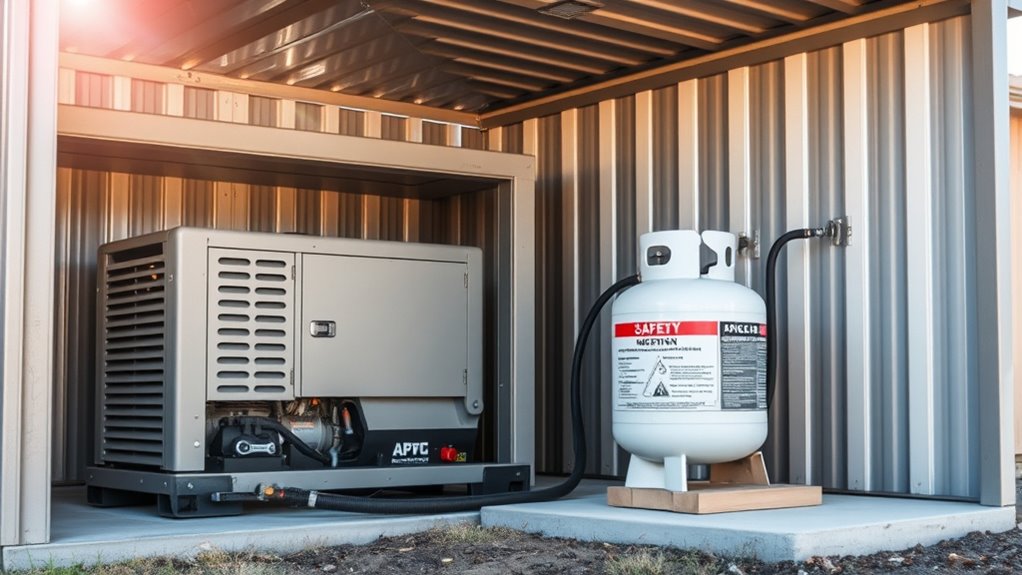
Proper ventilation and strategic placement are essential for safe generator operation. Poor placement or inadequate ventilation can lead to dangerous carbon monoxide buildup and increase fire risks. To guarantee safety, consider these guidelines:
- Place your generator outdoors, away from windows, doors, and vents to prevent exhaust fumes from entering your home.
- Follow ventilation requirements by installing it in a well-ventilated, open area that allows proper airflow.
- Keep the generator at least 20 feet away from structures and enclosed spaces to minimize exhaust exposure and allow dispersal.
- Ensuring the generator is located in a well-ventilated area helps prevent the buildup of harmful fumes and maintains safe operation.
Proper generator placement involves choosing a dry, level spot that’s protected from rain and snow. Adhering to ventilation requirements and strategic placement helps prevent hazardous fumes and ensures reliable backup power.
Fire Risks and Prevention Strategies
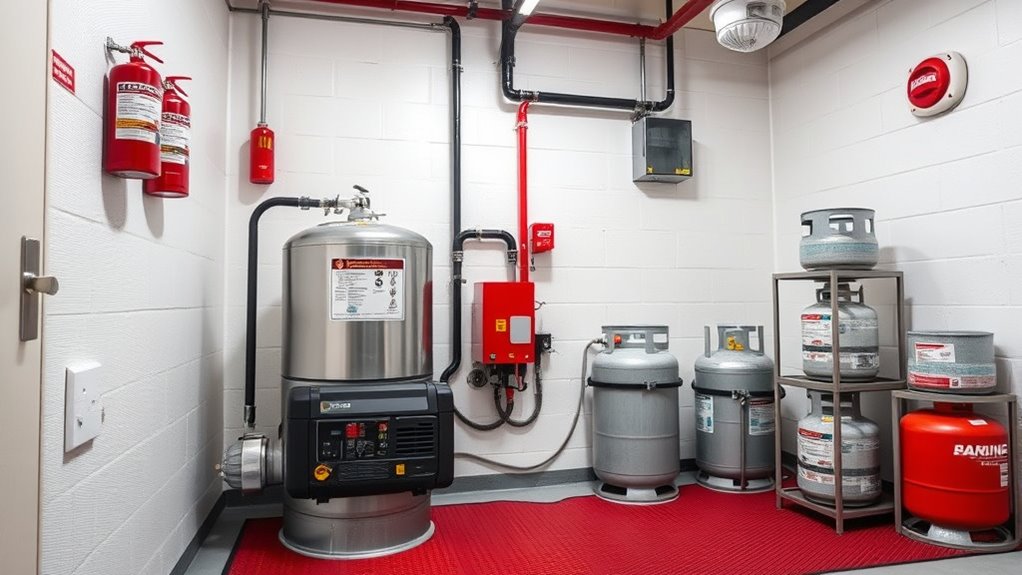
Fire risks are a serious concern when using gas or propane for backup power. You need to understand the potential hazards and implement safety measures to protect yourself and your property. Let’s explore how to stay aware of fire dangers and prevent accidents effectively. Incorporating powerful persuasive words in safety messaging can significantly improve awareness and compliance among users.
Fire Hazard Awareness
Understanding the fire risks associated with backup power sources is crucial for ensuring safety. You should always be aware of potential hazards, such as leaks or improper storage, which can lead to dangerous fires. Here are key steps to reduce risk:
- Regularly inspect your generator and fuel connections for leaks or damage.
- Choose the right fire extinguisher — ideally Class B for flammable liquids or gases — and keep it accessible.
- Plan and practice emergency evacuation routes in case of fire.
- Maintaining proper ventilation around your generator minimizes the buildup of dangerous fumes and reduces fire risk.
Knowing how to select an appropriate fire extinguisher ensures quick response, while having clear evacuation plans minimizes danger. Staying alert and prepared helps you prevent fires from escalating, protecting both your property and your loved ones.
Prevention and Safety Measures
To minimize the risk of fires from backup power sources, implementing effective prevention and safety measures is essential. Regular inspections help prevent fuel contamination, which can cause malfunctions or dangerous leaks. Proper storage of fuel in ventilated, designated areas reduces fire hazards and minimizes environmental impact. Use certified equipment and follow manufacturer guidelines to guarantee safe operation. Keep fire extinguishers nearby and install leak detection systems to catch issues early. Additionally, understanding the importance of home organization can aid in maintaining a safer environment by ensuring storage areas are orderly and accessible.
Maintenance and Inspection for Safety Assurance
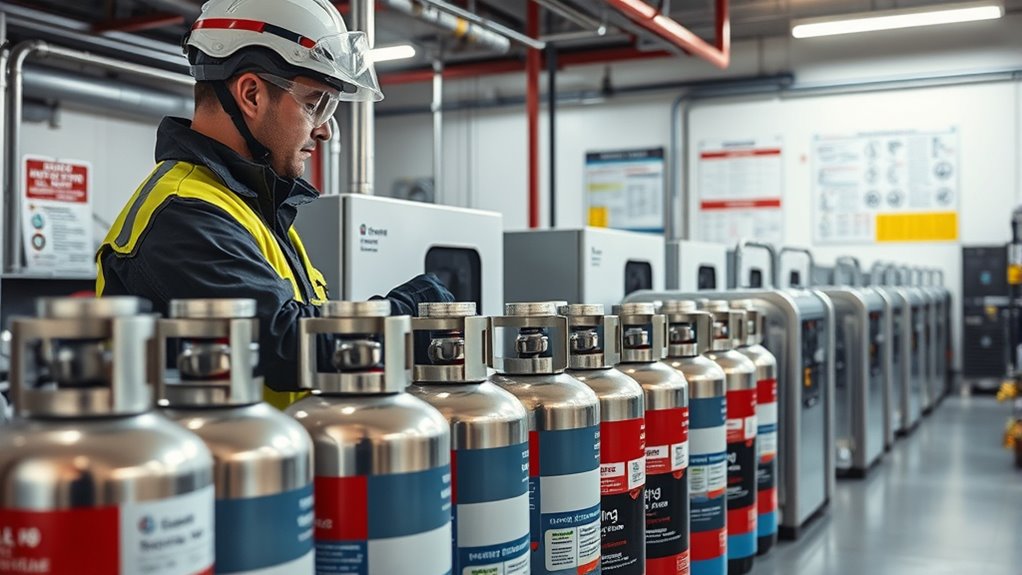
Regular system checks and leak detection are essential to keep your backup power safe. You should inspect your equipment frequently and use proper procedures to identify leaks early. Staying vigilant helps prevent accidents and guarantees reliable operation when you need it most.
Regular System Checks
Since backup power systems are critical during emergencies, you should prioritize regular inspections and maintenance to guarantee they operate safely and reliably. These checks help ensure fuel stabilization, preventing issues like gelling or degradation, and verify storage container materials are in good condition. To keep your system in top shape, focus on these key actions:
- Inspect storage containers for corrosion or leaks.
- Check fuel stabilization measures and replace old fuel as needed.
- Verify that fuel lines and connections are secure and free of damage.
- Regularly monitor Self Watering Plant Pots to ensure their reservoirs are functioning correctly and prevent overflows or dry conditions.
Performing these routine inspections minimizes safety risks and keeps your system in top shape. Regular maintenance not only extends equipment lifespan but also ensures safe operation during power outages.
Leak Detection Procedures
Detecting leaks in your backup power system is essential for safety and reliability. Start by listening for a strong fuel odor around the generator and connections, which signals a possible leak. Regularly inspect hoses, fittings, and valves for cracks or corrosion. Sensor calibration plays a critical role; ensure your leak detectors are accurately calibrated to detect even small fuel releases. If a sensor triggers an alert, shut off the system immediately and ventilate the area. Use soapy water on connections to check for bubbles that indicate leaks. Consistent maintenance, including sensor calibration and visual inspections, helps prevent dangerous leaks. Proper filter maintenance and regular inspections are also vital for maintaining overall system safety. Being proactive ensures your backup power system remains safe, reliable, and ready when you need it.
Emergency Procedures and Troubleshooting
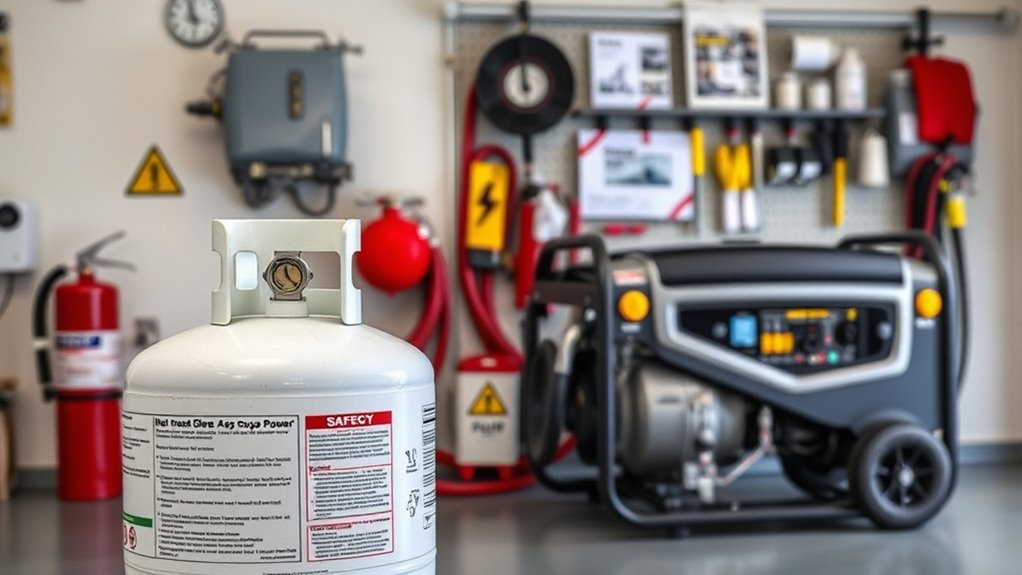
When a backup power system using gas or propane encounters issues, quick and correct responses can prevent accidents and minimize downtime. First, verify ignition sources are turned off to prevent sparks that could ignite leaks. Next, follow your emergency communication plan to alert everyone and coordinate response efforts. Finally, perform a safety check to identify the problem: gas leak detection and inspect connections and valves for damage. Test the ignition system to see if it’s functioning properly. If you detect a leak or smell gas, evacuate immediately and contact emergency services. Never attempt repairs if you’re unsure—your safety always comes first. Staying calm and following these steps can help you troubleshoot effectively while maintaining safety.
Frequently Asked Questions
How Long Can Propane or Gasoline Power a Backup Generator?
You can typically run a backup generator for about 8 to 24 hours on a full tank of propane or gasoline, depending on its size and load. To guarantee safe, continuous operation, regularly check your fuel storage and perform proper generator maintenance. Keep in mind that storing fuel safely and monitoring fuel levels prevents unexpected outages, so always plan your fuel supply accordingly for longer power needs.
Are There Environmental Impacts Associated With Each Fuel Type?
You might not realize it, but your choice between propane and gasoline considerably impacts the environment. Both fuels have environmental impacts, mainly through fuel emissions. Gasoline releases more carbon monoxide and other pollutants, causing air pollution and health issues. Propane burns cleaner with lower emissions, but it still contributes to greenhouse gases. Your decision influences air quality and climate change—so choose wisely for a greener planet.
What Are the Costs Involved in Switching Fuels Later?
Switching fuels later involves significant costs, mainly due to fuel storage adjustments and conversion costs. You’ll need to invest in new tanks or modify existing ones, which can be expensive. Additionally, converting your backup power system requires specialized work, potentially leading to downtime and higher expenses. Planning ahead helps you minimize these costs, so consider your long-term needs before choosing a fuel type.
Can These Fuels Be Stored Indoors Safely?
Did you know that improper indoor storage of fuels can cause dangerous explosions? You can store gas or propane indoors, but strict ventilation requirements are essential to prevent dangerous buildup of fumes. Properly ventilated spaces keep the air fresh and safe, reducing risk during storage. Always follow manufacturer guidelines and local codes, ensuring your indoor storage areas are well-ventilated and secure to protect your home and loved ones.
How Do Weather Conditions Affect Fuel Safety and Generator Operation?
Weather hazards like extreme cold, heat, or humidity can impact fuel stability, making it more volatile or degrading it faster. These conditions can also affect generator operation, causing it to run less efficiently or fail unexpectedly. You should regularly check fuel supplies and store them properly, especially during severe weather. Proper maintenance and understanding weather impacts help guarantee your backup power system remains safe and reliable when you need it most.
Conclusion
Choosing between gas and propane for backup power can be lifesaving. Did you know propane tanks are 20% safer to store and handle than gasoline? By following proper safety guidelines, you reduce fire risks and guarantee reliable power during emergencies. Whether you prefer the quick start of gasoline or the long-lasting safety of propane, staying informed and prepared keeps you confident. Make safety your top priority—your home and loved ones will thank you.
